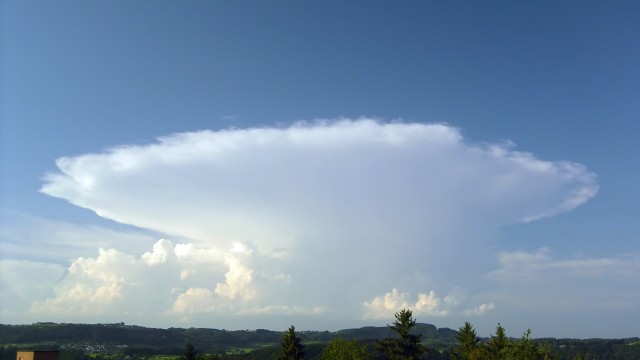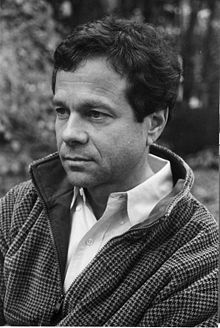Magnificent formations of white and gray cumulus scud across the sky. The patches of blue are incidental backdrop, the empty stage for the miracle of beauty.
 The mushrooming clouds explode like small nuclear bombs in the mind and heart. They hold the beginning of creation, creation that is everlastingly beginning, if one knows how to look.
The mushrooming clouds explode like small nuclear bombs in the mind and heart. They hold the beginning of creation, creation that is everlastingly beginning, if one knows how to look.
The scientist, with his arrogant knowledge, does not know how to look, anymore than the politician, with his perpetual calculation and manipulation. To look the mind must be completely still and the heart completely open, free from the noise and fear of thought.
In the battle of ideas, there are two doozies afloat in the West about nature. One is a twisted version of the Christian belief in an omniscient Creator, which places humans at the center and pinnacle of creation. The other is a bastardized version of Buddhism that sees ‘Buddha nature’ in everyone and everything.
Scientists in the West, steeped in the Christian tradition, are the strictest adherents and strongest spokesmen of the first inverse belief system. An amazingly self-centered and self-pitying example is in today’s New York Times, by a physicist named Alan Lightman. It’s entitled, “Our Lonely Home In Nature.”
In it, Lightman takes the Christian view in reverse, a belief that has become very popular with so-called realists. Spinning off the tornadoes that devastated parts of South and Midwest last week, and giving lip service to grief “over the human lives lost, the innocent people drowned or crushed without warning as they slept in their beds,” he avers, “beyond the grieving and anger is a more subtle emotion. We feel betrayed. We feel betrayed by nature.”
Oh really, do we? I know of no one directly affected by a hurricane or tornado, much less an attack by a wild animal, that feels “betrayed” by nature. That either reflects the mindset of the author, or is a straw man, set up simply for the purpose of being knocked down. The vast majority of people recovering from natural disasters don’t sustain personal reactions against nature, or God, however they conceive of either.
Despite proclamations of the nature of nature by scientists who don’t understand their own nature, and despite their attempts to boggle and bind the mind with supposed facts such as “we can estimate that only about one millionth of one billionth of 1 percent of the material of the visible universe exists in living form,” the mystery of life, much less the mystery of consciousness in the cosmos, mercifully persists.
In astounding feat of projection, Lightman casts everything in his shadow: “The relationship between nature and us is one-sided. There is no reciprocity. There is no mind on the other side of the wall.”
Not content to leave it there, and threatened by something far more than the storm he felt in his little sailboat off the coast of Greece, Lightman intones: “Nature, in fact, is mindless. Nature is purposeless. Nature simply is. We may find nature beautiful or terrible, but those feelings are human constructions.” Sadly, that is the ultimate ‘human construction,’ and genuine feeling, human or otherwise, is entirely absent in such sentiments.
Such views would be risible if not for the denial of the tremendous destructiveness of the human species on this planet. To that fact, Lightman has an answer that should make the blood of any living human being run cold: “We should not be concerned about protecting our planet… our concern should be about protecting ourselves.”
On the other side of the coin we have the idea of “Buddha nature.” It also offers a marvelous escape from having to see people and things as they are. But unlike the nihilism expressed above, there’s a kernel of truth in whitewashing everything, especially human nature, with Buddha nature.
In its present, trendy usage, “Buddha nature” refers to the real or imagined divine unconditional love that adherents believe is the main force in the universe. Whether such a force exists in actuality is one thing; it’s quite another to say, as so many practitioners of this latter-day belief system do, “you already have it.”
‘Buddha nature,’ if it means anything, points to an underlying and overarching cosmic intelligence. As opposed to “there is no mind on the other side of the wall,” the testable truth is that when we bring down the walls of thought and fear within, there is Mind.
The comforting ideational core (rather than the actual experiencing) of Buddha nature is: “We already have it. We are it.” That idea is lot more clever than nihilism, but perhaps no less misleading. There is no shortcut to the numinous; we can’t simply “call upon the animating force of the unseen.”
A friend, referring to how many people she knows who have cancer, recently said, “The choice is between delusion and disease. I choose delusion.” That is no choice at all.
Attention is a capacity of the brain that has nothing to do with the self and effort; it is not under the direction of the will. Attention puts thought in its place and quiets it completely when it isn’t needed.
When the mind-as-thought is deeply still through attending to its movement, the movement of actuality and insight are awakened within. That movement is neither inside nor outside the brain, but both, undivided and non-dualistic.
Martin LeFevre
Links:
http://www.nytimes.com/2014/05/03/opinion/our-lonely-home-in-nature.html?_r=0
http://www.nytimes.com/2014/04/20/fashion/Modern-love-Is-God-Just-Not-That-Into-Me.html?_r=0

